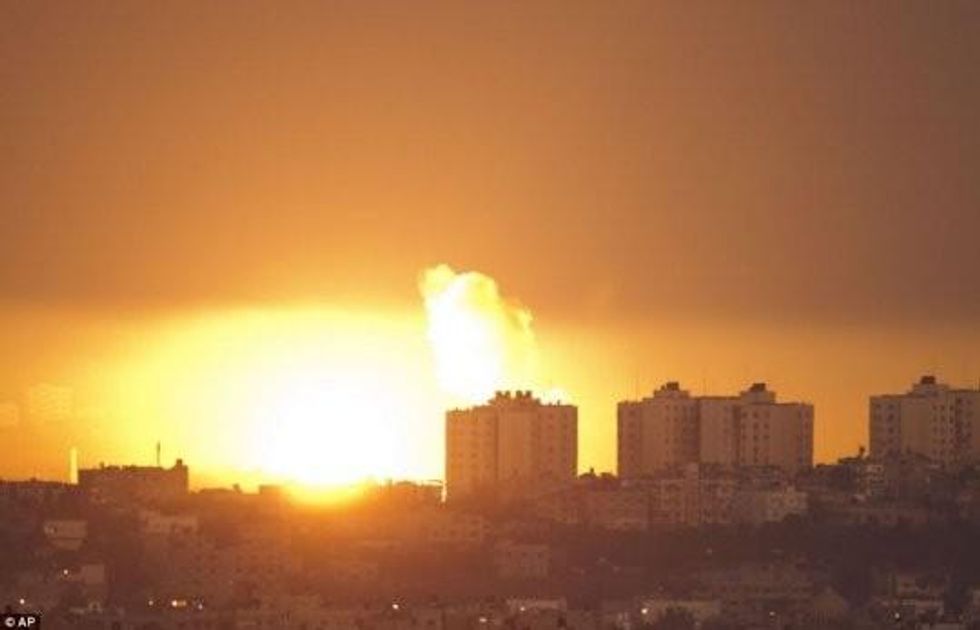An extreme act, such as Israel's assassination of Hamas military chief Ahmed al-Jabari, invites extreme consequences. These are now threatened by Gaza militants who vow to resume the suicide bombings that terrorised Israeli cities a decade or more ago. Hamas official Ismail al-Ashqar said the "resistance's possibilities" were now unlimited. Abu Ahmed of Islamic Jihad's military wing warned all means would be used to exact a terrible revenge for Jabari's death. "There are no more red lines," he said.
Binyamin Netanyahu, Israel's pugnacious prime minister, and his faithful sidekick, defence minister Ehud Barak, presumably took such inflamed reactions into account when they set Operation Pillar of Defence in train. Perhaps they discount them as empty rhetoric on a par with Hamas's "opening the gates of hell" soundbite, grimly regurgitated by the BBC and other media on Thursday. If they do, they risk repeating costly mistakes of the past.
The history of Middle Eastern wars, and more particularly, Israel's most recent conflicts - Operation Cast Lead in Gaza in 2008 and Lebanon in 2006 - is pitted with miscalculations about the capabilities of the "enemy", his ability to inflict real pain and the length of time needed to subdue him. Cast Lead, which left up to 1,400 Palestinians and 13 Israelis dead, was a bloody own goal, dressed up as a victory, that entailed severe, lasting political and diplomatic consequences for Israel without achieving its primary military objective - the defanging of Hamas.
Given that, after the initial shock, Palestinian resistance is likely to grow rather than subside, what is unclear now, as in 2008, is how far Israel's leaders are prepared to go in carrying the fight to Gaza, and where it may end. What constitutes success? Will it take a ground invasion, as some have hinted? The hail of rocket fire that followed Jabari's killing suggests an open-ended conflict may be unfolding. The deaths of three Israeli civilians on Thursday morning, killed by a missile that evaded Israel's much vaunted Iron Dome air defence, did not follow the Netanyahu-Barak script.
Ostensibly learning from past errors, Barak defined the operation's aims this time around. Israel, he said, sought to strengthen deterrence, deplete the Hamas rocket infrastructure, damage Hamas and the other terror organisations, and minimise harm to the Israeli "home front". But looked at closely, these are vague objectives, difficult to quantify or measure in any but the broadest terms. "This is the beginning of an event and not the end," Barak admitted.
"The IDF will keep up the relentless air pressure with the unspoken threat of launching a ground operation if Hamas and the other terror groups strike at Tel Aviv or other strategic areas," commentator Mitch Ginsburg suggested. "Beyond that, little is clear, for Hamas knows that Israel does not want to topple the regime entirely and usher in an era of chaos in the Gaza Strip, and Israel knows that it is very difficult to score points against a terror organisation reared on the ethos of suicide and dispersed among one of the most densely populated civilian areas in the world."
Domestic political and international factors increase the potential for miscalculation and escalation. Netanyahu, who cultivates a strongman image, will seek-re-election in January. He is striving to impress Israeli voters with a decisive blow against Hamas, and cannot now desist until such a blow has been demonstrably delivered.
Past constraints on Netanyahu's behaviour are absent this time. There is no discernible peace process, and no active US engagement (after Barack Obama's first-term efforts were ignominiously rebuffed). The west's favourite "moderate Arabs" are missing in action, or on the other side of the fence. Egypt's government has condemned Israeli actions; Jordan, destabilised by the Syria chaos, is in the throes of what could be the next Arab spring uprising. Meanwhile, the imminent bid by Mahmoud Abbas, the Palestinian president, for non-member UN observer status for Palestine, staunchly opposed by Israel and the US, threatens further polarisation inside and outside Palestine.
Ironically, Netanyahu's uncontrollable new Gaza war could also tip the scales in an internal power struggle within Hamas, strengthening the faction gathered around Gaza political chief Ismail Haniyeh at the expense of those Hamas leaders in exile who hope to succeed Khaled Meshaal. Netanyahu's war may actually end up bolstering Hamas in Gaza, or alternatively cause it to splinter and lose ground to more violently confrontationalist jihadi groups. Neither outcome would serve the all but forgotten cause of peaceful co-existence.

